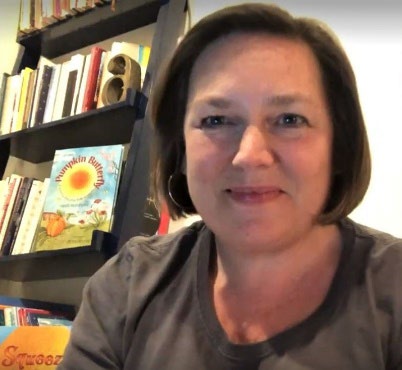 |
DESPITE SPRING
By Michael C. Davis
The inner light of the gallery is muted.
The long scroll of jonquils is brushed in ink, without color.
Color is in it though.
The blossoms in radiant grays; the leaves
black and blown gloriously
by unseen breezes on some undulation the artist
had just found and executed for us all.
The scroll calls all other things of the world
into question. Each blade, each corona
deliberately formed, bright with being
in the gallery’s tempered light. |
“I have been working with the Pick a Poet program since 1999…I particularly like working with children in the earlier grades and getting them to think outside of themselves, see the world in a new way, and express what they find.”
For each workshop handouts with poetic examples are provided. Each workshop opens with a free association word exercise and closes with reading to give students the opportunity to share.
Offered Programs:
Persona/Point of View (1-12)
We eye a world that looks right back at us. In this workshop, we will invent creatures and things around us with their own poetic lives: the clock, the blackboard, the ball on a field, the television hanging from the wall. Possibilities surround us. How can we make them speak? Observation, imagination, and metaphor are emphasized.
Words and Magic: Pulling a Poem Out of Your Hat -NEW (1-12)
Writing is the only occupation that has its own malady – writer’s block. There is no carpenter’s block, or painter’s block. How do we start to write a poem from nothing and have a draft within an hour? A free association on a word will give us a start. A universe of ideas and objects will give us a subject. What we gather through our senses and emotions will give us an approach. Metaphor and simile will guide our senses and emotions to give the poem an arc. And what we know of the rhythms of words and speech will suggest a form. Poetry as meditation with a pencil is emphasized.
Counting Down; Counting Up (K-2)
During this workshop, students work on a group poem. Borrowing from the poet Paul Janeczko, we write a poem of two-line stanzas that start with 1 or 10 and count up to 10 or down to zero. The students propose and vote on the subject for the poem and its setting and then work on the rhymes for the poems. So the subject could be lizards, the setting could be the woods. If the number is four, the stanza could be: ”Four large lizards climbed a tall pine tree/One stubbed his green toe, and then there were three. “ Arithmetic, rhyming, description, and group participation are emphasized.
Wishes and Dreams (K-2)
In this workshop, students’ wishes and dreams become poems. We write a group poem in which each student contributes a line. Then we turn to writing our own poems, developing our wishes and dreams. Imagination, metaphor, and group writing are emphasized.
The Five Senses (1-12)
How can we involve all of our senses in a poem? How can we use simile and metaphor to make our poems taste, feel, look, sound, and smell? How can this work for a poem about baseball, a swing set, or a pizza? Tell me what the pepperoni feels, what the baseball hears as it lands in the glove, etc. Memory, imagination, and metaphor are emphasized.
Letters and Odes (1-12)
An ode is like a letter to a loved one: “Dear June 5th…”, “O bird …”, “Bee! I’m expecting you!…” In this workshop, we use simple forms of address to fashion odes to what we like most or like least in order to tap our emotions and harness them for a poem. Observation, imagination, and metaphor are emphasized.
 Contact
Contact  Calendars
Calendars Careers
Careers Engage
Engage  District
District










